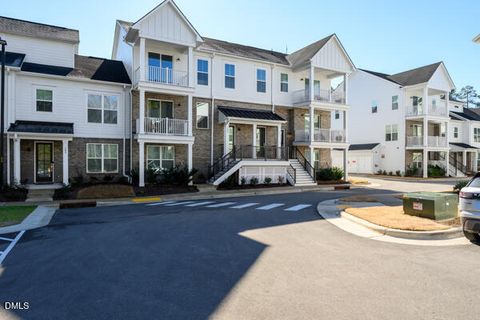Homes for Sale Near Research Triangle Park
Top Employers
- IBM
- Cisco Systems
- Biogen
- GlaxoSmithKline (GSK)
- RTI International
Research Triangle Park was conceived in the late 1950s as a collaborative effort to drive economic growth and innovation in North Carolina. The park was established in 1959 and has since grown into one of the most significant research hubs in the world. Over the decades, RTP has attracted major corporations and research institutions, fostering a spirit of collaboration between academia, industry, and government.
While RTP itself is more focused on business and research facilities, nearby areas offer a variety of shopping options:
- The Streets at Southpoint
- Brier Creek Commons
- Parkside Town Commons
- Downtown Durham
Overview
Research Triangle Park (RTP) in North Carolina is one of the largest research parks in the world and a global epicenter of innovation. Established in 1959, RTP spans 7,000 acres and is strategically located between three major research universities: Duke University, the University of North Carolina at Chapel Hill, and North Carolina State University. Known for its focus on research and development, RTP is home to more than 300 companies and over 60,000 employees, making it a critical hub for technology, biotechnology, and life sciences.
Current Landscape
Community and Lifestyle
RTP is a unique community focused on innovation and collaboration. While traditionally not a residential area, RTP has begun to incorporate mixed-use developments to create a more vibrant live-work-play environment. Key highlights include:
- Hub RTP: A $1.5 billion development project designed to create a mixed-use town center within RTP, offering residential units, retail spaces, and dining options. This development aims to transform RTP into a more integrated and dynamic community.
- Frontier RTP: An innovation campus that provides coworking spaces, offices, and lab facilities for startups and established companies alike. This space fosters collaboration and creativity, hosting numerous events and community programs.
Education
RTP is supported by its proximity to top-tier research universities that drive much of its innovation and talent pipeline. Key educational institutions include:
- Duke University: Renowned for its medical research and engineering programs.
- University of North Carolina at Chapel Hill: Known for its public health, business, and law programs.
- North Carolina State University: Recognized for its engineering, computer science, and agricultural research.
Additionally, Wake Technical Community College recently opened a new campus within RTP, providing specialized programs and workforce training tailored to the needs of RTP companies.
Economic Growth and Development
RTP continues to be a powerhouse of economic growth and development. Key factors include:
- Mixed-Use Developments: Projects like Hub RTP are transforming the park into a live-work-play community, integrating residential, commercial, and recreational spaces.
- Green Initiatives: RTP is committed to sustainability, with initiatives aimed at reducing carbon footprints, promoting green buildings, and enhancing green spaces.
- Interstate Access: Proximity to major highways such as I-40 and I-540 provides convenient access to Raleigh, Durham, and Chapel Hill.
- Public Transportation: GoTriangle offers extensive bus services connecting RTP to the broader Triangle area. Additionally, a new transit hub is in development to further improve connectivity.
- Air Travel: RTP is a short drive from Raleigh-Durham International Airport (RDU), providing convenient national and international travel options.
- Innovation Districts: Expansion of innovation districts like Frontier RTP to support startups and emerging companies.
- Collaboration with Universities: Strengthening partnerships with local universities to enhance research capabilities and talent pipelines.
- Investment in Infrastructure: Continued investment in infrastructure to support the growing needs of businesses and residents within RTP.
- Interstate 40 (I-40): Connects RTP to Raleigh, Durham, and Chapel Hill.
- Interstate 540 (I-540): Provides a loop around the Triangle area, enhancing regional connectivity.
- GoTriangle Transit: Offers extensive bus routes and plans for a new transit hub to improve public transportation within the park.
Future Prospects
Sustainable Growth
RTP’s future is centered around sustainable and innovative growth. Plans for the future include:
Transportation and Connectivity
RTP benefits from excellent transportation links that facilitate easy access to the park and surrounding areas. Key features include:
Economic Opportunities
RTP continues to attract a diverse array of businesses and talent. Future economic initiatives include:
Population Growth Since 1990
As a primarily business-focused area, RTP has not seen traditional residential population growth. However, the development of mixed-use projects like Hub RTP is beginning to change this dynamic, introducing residential options within the park.
Transportation/Interstate Access
RTP's strategic location offers excellent transportation and interstate access:
Research Triangle Park continues to be a beacon of innovation and economic growth, evolving to meet the demands of the 21st century while maintaining its core mission of fostering collaboration and development.
Places of Interest
- Hub RTP
- Frontier RTP
- Boxyard RTP
Want the full market report for Research Triangle Park- RTP?
Amy wants to ensure that you have all the information needed to make the best decisions when it comes to your home goals. When you enter your info below you will get instant access to the area's latest market report, complete with sales and demographic trends.






























































